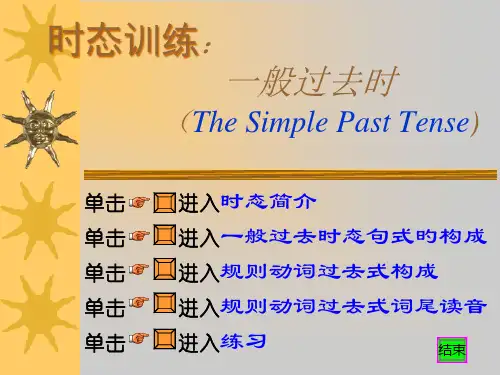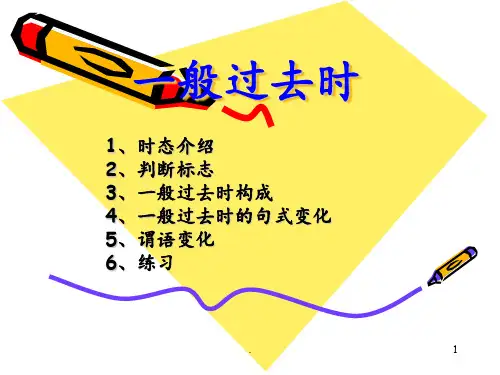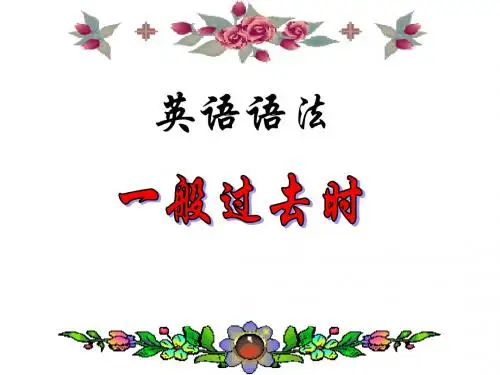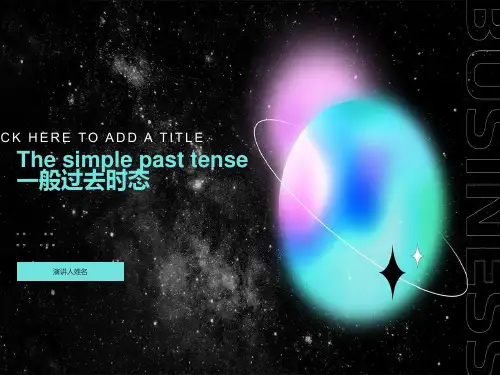英语一般过去时精品PPT课件
合集下载
一般过去时.语法讲解PPT

时间状语不同
一般过去时常用的时间状语包括过去的时间点、过去的时间段 等,而过去完成时常用的时间状语包括“已经”、“之前”等
。
05
一般过去时的练习与巩固
填空练习
总结词
填空练习是巩固一般过去时的有效方法,通过在句子中留空,让学生填写正确的动词时态,加深对一般过去时的 理解和运用。
详细描述
在填空练习中,教师可以选择一些包含一般过去时的句子,故意去掉动词时态部分,让学生根据上下文语境和时 态规则填写正确的时态。例如,“Yesterday, I ____(go) to the park with my family. We ____ (have) a great time.” 学生应该填写“went”和“had”。
表示过去的习惯或经常发生的动作
描述过去的习惯
一般过去时可以用来描述过去经常发 生的动作或习惯,例如“He used to smoke a pack of cigarettes a day” (他以前每天抽一包烟)。
描述过去的频率
一般过去时可以用来表示过去某个时间 段内发生的动作的频率,例如“We met every week”(我们每周见面一 次)。
一般过去时表示动作已经完成,而过去进行时则表示动作正在进行中。
总结词
时间状语不同
详细描述
一般过去时常用的时间状语包括过去的时间点、过去的时间段等,而 过去进行时常用的时间状语包括“当时”、“正在”等。
与过去完成时混淆的用法
总结词 详细描述
总结词 详细描述
动作是否完成
一般过去时表示动作已经完成,而过去完成时则表示在过去的 某个时间点之前已经完成的动作。
选择练习
总结词
选择练习是一种常见的练习方式,通过提供多个选项,让学生选择符合语境和语法规则的答案,进一 步巩固一般过去时的运用。
一般过去时常用的时间状语包括过去的时间点、过去的时间段 等,而过去完成时常用的时间状语包括“已经”、“之前”等
。
05
一般过去时的练习与巩固
填空练习
总结词
填空练习是巩固一般过去时的有效方法,通过在句子中留空,让学生填写正确的动词时态,加深对一般过去时的 理解和运用。
详细描述
在填空练习中,教师可以选择一些包含一般过去时的句子,故意去掉动词时态部分,让学生根据上下文语境和时 态规则填写正确的时态。例如,“Yesterday, I ____(go) to the park with my family. We ____ (have) a great time.” 学生应该填写“went”和“had”。
表示过去的习惯或经常发生的动作
描述过去的习惯
一般过去时可以用来描述过去经常发 生的动作或习惯,例如“He used to smoke a pack of cigarettes a day” (他以前每天抽一包烟)。
描述过去的频率
一般过去时可以用来表示过去某个时间 段内发生的动作的频率,例如“We met every week”(我们每周见面一 次)。
一般过去时表示动作已经完成,而过去进行时则表示动作正在进行中。
总结词
时间状语不同
详细描述
一般过去时常用的时间状语包括过去的时间点、过去的时间段等,而 过去进行时常用的时间状语包括“当时”、“正在”等。
与过去完成时混淆的用法
总结词 详细描述
总结词 详细描述
动作是否完成
一般过去时表示动作已经完成,而过去完成时则表示在过去的 某个时间点之前已经完成的动作。
选择练习
总结词
选择练习是一种常见的练习方式,通过提供多个选项,让学生选择符合语境和语法规则的答案,进一 步巩固一般过去时的运用。
一般过去时PPT获奖课件

Just now 刚刚 Last week 上周 in the past 过去 that day 那天 last year 去年 that year 那年 that month 那个月 just now 刚刚
一般过去时态句式旳构成
陈说句式
动词
肯定式
否定式
I was ….
I was not(wasn’t)….
订正答案 返回练习
一般过去时态练习
把下列句子改成相应时态
1. He usually gets up early in the morning.
But he
got up
late today.
2. She usually works from 8 a.m. to 5 p.m.
But yesterday she worked from 8 a.m. to 6 p.m.
3. stop 6. trip 9. want 12.have e 18.put 21.read
订正答案 返回上页
动词过去式转换练习
答案
1. look looked 4. carry carried 7. call called 10.are were 13.do did 16.say said 19.eat ate
did not(didn’t) work.
There was …. there There were…. be
There was not (wasn’t) …. There were not (weren’t)…问句式
动词
疑问句式和简略答语
第一人称
第二人称
be He /She/it was….
He/She/It was not(wasn’t)….
一般过去时讲解PPT课件

Yes,you did.
Yes,I did. Yes,he/she/it did.
No,you did not. No, I did not. No,he/she/it did not.
work Did we work?
Did you work? Did they work?
Yes,we/you did. Yes,we did. Yes,they did.
grow -- grew know -- knew throw -- threw blow -- blew write -- wrote drive -- drove ride -- rode get -- got forget -- forgot lend -- lent send -- sent spend -- spent say -- said */sed/ pay -- paid stand -- stood understand -- understood let -- let put -- put cut -- cut read -- read2*0
.
1
1.定义:
(用法一) 一般过去时态表示过去某个时间发生的动 作或存在的状态,常和表示过去的时间状语连用;
eg:I got up at 7:00 yesterday.
My father was at work yesterday afternoon
(用法二) 也表示过去经常或反复发生的动作,常和 表示频度的时间状语连用。
写出下列动词的过去式:
go
went
use
think thought live
be
was/ were wake
happen happened keep
一般过去时态ppt课件

2、表示过去经常或反复发生的动作。 My father often went to work by bus last year. When I was a child, I often listened to music.
可编辑课件PPT
9
6.练习
1.They_w_e_re(be) doctors last year. 2.You _h_a_d(have) a class this morning. 3.She_ra_n_ (run) very fast yesterday.
passed cooked
2、元浊 /d/ ,即 ed 在元音,浊辅音后面念 /d/ ,
例:borrowed enjoyed
called moved
3、/t/ /d/ 之后念 /id/ , 即 ed 在 /t/ /d/ 音后面念 /id/
可编辑课件PPT
例:wanted shouted needed counted6
4.一般过去时的否定和一般疑问句 1)We had a good time yesterday.
We didn’t have a good time yesterday. Did you have a good time yesterday? 2)She was a teacher in 1980s.
4.She_s_tu_d_ied (study) Chinese two years ago. 5.He_p_la_yed(play) tennis last week.
6.He found an amusing book.(变否定和一般疑问)
He didn’t find an amusing book.
stop stopped plan planned
初一英语语法:一般过去时(共22张PPT)

cost →cost花钱
read→read读书
cut → cut 砍,剪 hurt → hurt受伤
2)变元音字母为a run→ran跑
give→gave给 sing→sang唱歌
come → came过来 drink→drank喝 swim→swam游泳
sit→sat坐下 begin→began开始
feel build fight give teach sing buy cut come draw drink drive hope use start
felt built fought gave taught sang bought cut came drew drank drove hoped used started
2. watch, John, did, TV, weekend, last. _J_o_h_n_d_i_d_w_a_t_ch__T_V_l_as_t_w_e_e_k_e_n_d_. ___________
3. went, I ,to, by, park, a, bike
_____I _w_e_n_t_t_o__a_p_a_r_k_b_y__b_ik_e__. ___________ 4. jumped, the, into, lake, he, and, the, to, swam, kite.
19) My sister _w_a__s_ (be) born on June 5. 1996. 20) W__e_r_e_ (be) your parents at home just now? 21) He _s_tu__d_ie_d_ (study) French here last year. 22) She __d_i_d_ (do) homework last night. 23) They _w__e_n_t(go) to the zoo yesterday morning. 24) We __h_a_d_ (have) a party last Saturday. 25) Joy _v_is_i_te__d (visit) me yesterday evening. 26) They __l_iv_e_d_ (live) here two years ago. 27) He _w__a_s_(be) here a moment ago.
一般过去时课件(PPT)课件

Where did the children have a good time?
用动词的适当时态填空
____ you ________ (remember) to buy the oranges yesterday? 2.Who ________ (play) computer games yesterday. 3.We _____ (go) to the cinema last night. The film _____ (be) very good. 4.What time ____ you ____ (get) to school this morning? 5.Jim ___ (do) a lot yesterday. He ____ (go) shopping and ______ (cook) supper.
lived
ate
had
made
played
cooked
Did
规则变化 1.一般加ed
2.以e结尾加d
3.末尾只有一个辅音字母的重读闭音节词,先双写这个辅音字母,再加ed .
work —
worked
change —
changed
prefer —
preferred
stop —
stopped
study —
didn’t do
Did
find any
How long did
stay
Was
any
Thank you
CLICK HERE TO ADD A TITLE
单击此处添加文本具体内容
演讲人姓名
do/ does
didn’t
did
didn’t watch
用动词的适当时态填空
____ you ________ (remember) to buy the oranges yesterday? 2.Who ________ (play) computer games yesterday. 3.We _____ (go) to the cinema last night. The film _____ (be) very good. 4.What time ____ you ____ (get) to school this morning? 5.Jim ___ (do) a lot yesterday. He ____ (go) shopping and ______ (cook) supper.
lived
ate
had
made
played
cooked
Did
规则变化 1.一般加ed
2.以e结尾加d
3.末尾只有一个辅音字母的重读闭音节词,先双写这个辅音字母,再加ed .
work —
worked
change —
changed
prefer —
preferred
stop —
stopped
study —
didn’t do
Did
find any
How long did
stay
Was
any
Thank you
CLICK HERE TO ADD A TITLE
单击此处添加文本具体内容
演讲人姓名
do/ does
didn’t
did
didn’t watch
一般过去时课件(PPT)
B pictures in the park 1.I ___
Exercises
last weekend. A.take B.took C.was D.draw
A 2. Did you ___football yesterday. A. play B. played C. were D. are
A 3.He always _____me last term. A. helped B. helps C. helping D. help 4.Where did you ___last B Monday? A.went B.go C.do D.did
climbed a mountain
mped
fly kites read a book sing and dance eat good food
swim do am/is are study
flew kites read a book sang and danced ate good food
6. He usually gets ____ (get) up at 6 getting in the morning. Look! He is ______ (get) up now. But yesterday he got (get) up very late, so he ____ went (go) to school late. He was ____ ___ (be) late for school.
动词原形、第三人称单数 动词过去式
They don’t watch TV in the evening. didn’t watch TV last night. They _________
She doesn’t play basketball after school. She _________ didn’t play basketball after school yesterday. Do you go to school on foot every day? go to school on foot yesterday. ___ Did you __ Does he go to school by bus every day?
初中英语语法 八大时态之一般过去时课件
They live in Shanghai . They lived in Shanghai last year.
I study in Beijing. I studied in Beijing .
she stops. she stopped.
I go to school by bike every day. I went to school by bike yesterday.
以e结尾的,直接在词尾加d dance - danced 辅音加y结尾,变y为i加ed study - studied 重读闭音节结尾,双写词尾字母加 ed stop - stopped 3.不规则变化: 没有变化 cut -cut put-put come-come hit-hit let-let 特殊情况 have/has—had, go---went, eat---ate, say—said
1
last year
时间
last week
标志 2 last weekend
The day before
3 。。。。。。
一般过去时
动词的变化
一般过去时-含有be动词的
• She is in Beijing.
She was in Beijing .
• I am a student.
I was a student.
read — read
write — wrote say — said
play — played
learn — learned buy — bought cry — cried
study — studied swim — swam walk — walked
一般过去时主要动词的变化:
I study in Beijing. I studied in Beijing .
she stops. she stopped.
I go to school by bike every day. I went to school by bike yesterday.
以e结尾的,直接在词尾加d dance - danced 辅音加y结尾,变y为i加ed study - studied 重读闭音节结尾,双写词尾字母加 ed stop - stopped 3.不规则变化: 没有变化 cut -cut put-put come-come hit-hit let-let 特殊情况 have/has—had, go---went, eat---ate, say—said
1
last year
时间
last week
标志 2 last weekend
The day before
3 。。。。。。
一般过去时
动词的变化
一般过去时-含有be动词的
• She is in Beijing.
She was in Beijing .
• I am a student.
I was a student.
read — read
write — wrote say — said
play — played
learn — learned buy — bought cry — cried
study — studied swim — swam walk — walked
一般过去时主要动词的变化:
小学英语一般过去时精品PPT课件 图文
“呵!黑色的斗篷、掩着的嘴脸,闭上 眼睛你 就出来 ,睁开 眼睛你 就躲在 阴影里 ,撒旦 ,今天 你总算 露了回 脸…… ”子都 愤愤不 已…… 估摸着 从打电 话到现 在,她 们在车 里呆了 也有一 小时了 …… 若的车启动了,那时子都想追上去问 个究竟 ,转念 又怕她 误以为 是在监 视她, 彼此不 愉快, 那是他 不愿意 见到的; 况且与 她说什 么,质 问?凭 什么… …正犹 豫间收 到若的 信息, 说她在 家洗澡 ,要他 放心… … “呵呵……都听见没有?她在家里洗澡 啊…… ”子都 快疯了 ,不知 那时他 的心肠 做何颜 色…… 一个他 爱了十 四年的 女人当 着他的 面扯谎 ,为一 个他所 不屑的 男人回 护、并 与之厮 混…… 妈妈的 心(《 妈妈的 心》), 当那个 王子向 妈妈索 取那颗 能给他 带来欢 怡之心 的时候 ,腹腔 里何尝 还有 颗心… …他一 句话也 说不出 来,亦 或也没 必要说 什么, 万箭穿 心,扎 向他的 是剑… … 七窍喷火,他驾着车漫无目的的一路 狂奔… …“天 经地义 ,人之 常情。 不错, 她爱谁 不关我 的事儿 。然而 ,但凡 年轻点 的、英 俊点的 、血腥 点的, 不,有 个人样 就行, 我甚至 会为她 祝福… …就他 ,一只 缠了她 多年的 癞蛤蟆 ,竟给 她盘了 去,大 侮,奇 耻大辱 ……呵 呵…… 他竟是 用了什 么做诱 饵?一 块饼子? 一张画 饼就给 她钓了 去…… 这是她 吗…… ”他窝 囊、无 地自容 ……
那夜子都想,自打他俩分手以来,他 看着若 总觉得 隔着、 不透亮 ,像在 雾里, 掩着纱 帘…… 是由于 他不适 应新角 色、心 理有问 题,还 是她的 确有事 儿瞒了 他…… 他画着 问号, 一时又 理不出 头绪… … 第二天上午,也就是周五上午,子都 给亦冰 打电话 问若的 情况, 亦冰说 昨晚他 走后若 就没再 醒过来 ,早晨 他离家 的时候 她还在 床上躺 着;说她 应该是 不去上 班了, 是他给 雨馨准 备的早 饭、送 的学校 ……子 都想一 定是若 的酒劲 还没缓 过来。 他不想 打扰她 休息, 想下午 与她联 系。 下午子都给若打电话,那时她正在去 单位的 路上, 子都说 都三点 了,问 她这么 晚还去 单位干 吗,她 说单位 有事儿; 他又约 她吃晚 饭、或 是找个 地方坐 会儿; 她说晚 上约了 人…… 子都心 里很是 不爽, 嘴上又 不便说 什么, 就说她 身体不 好,办 完事儿 早点回 家,到 家后告 诉他一 声;她应 承着 …… 那晚子都在家心不在焉地看着电视, 总觉着 要发生 点什么 事儿… …“她 这叫归 家吗?今 天这事 儿、明 天那事 儿,以 前也没 说这么 忙过; 还说身 体不好 ,好人 又怎样? 谁经得 起天天 这般折 腾…… 唉!碍 着我啥 事儿了 ,跟着 瞎起哄 ,爱咋 咋吧… …”他 说是不 挂念, 心里别 扭着。 九点过 半,仍 无若的 消息, 他心神 不宁… …“又 喝了? 不要命 了?昨晚 的事情 过眼就 忘…… 可怜的 亦冰, 这些年 真够难 为他的 ……” 他待要 给若发 信息, 问她是 不是还 在外面 ,她给 他发来 信息, 说她到 家了, 要他放 心…… 他悬着 的心算 是告一 段落地 放下来 ,也该 洗洗睡 了…… 子都刚躺下,有电话打进来,是杨巍 的,他 吃了一 惊,第 一反应 就是若 ……这 还是杨 巍初次 用手机 给他打 电话, 他的手 机号码 也是上 次找他 办事儿 时存下 的。“ 若是不 是还在 外面没 回家?出 什么事 儿了… …”他 刚待接 听,那 边挂了 ,等了 几分钟 ,对方 没再打 过来… …“诶 ?怎么 回事儿 ?这么 晚了, 误碰… …不对 ……不 管怎样 ,打过 去问问 。”于 是他就 把电话 打过去 ,电话 通着, 没人接 听,他 心犯狐 疑,一 连又打 了七、 八个过 去…… “莫非 他与若 在一起 ……绝 不是误 碰…… ”他随 即给若 打电话 ,没人 接,再 打…… “她俩 一定在 一起… …发生 了什么? 不行, 得去找 她…… ”他毫 无迟疑 ,起身 穿上衣 服…… “今晚 一定要 见着她 ……” 一种不 安袭击 着他。 他想给 亦冰打 电话, 问若在 不在家 ,又一 想先别 大惊小 怪的, 过去看 看若的 车是否 在家再 做道理 。他匆 匆离家 ,走的 时候连 屋里的 灯也没 顾得关 …… 路上车少,子都心似弹飞,往日的路 程此刻 只用了 一半的 时间。 他留心 过往车 辆,生 怕路上 与她错 过。在 距若的 家不足 一分钟 里程时 ,他发 现前面 路边上 停着一 辆白色 的小车 ,尾灯 闪亮着 ……“ 车上一 定有人 ……” 他心里 一惊, 因为杨 巍家就 在这儿 附近。 “莫非 若的车 ……” 车速太 快,他 急点刹 车,错 车的一 刹凝眸 望去, 正是若 的车, 前排影 影绰绰 的两个 人影, 他脑袋 嗡地一 声,竟 至于狠 踩了一 脚油门 ,那车 轰的一 声穿窜 出去多 远…… 待他回 过神来 ,赶忙 把车停 靠在路 边,深 呼吸… …
那夜子都想,自打他俩分手以来,他 看着若 总觉得 隔着、 不透亮 ,像在 雾里, 掩着纱 帘…… 是由于 他不适 应新角 色、心 理有问 题,还 是她的 确有事 儿瞒了 他…… 他画着 问号, 一时又 理不出 头绪… … 第二天上午,也就是周五上午,子都 给亦冰 打电话 问若的 情况, 亦冰说 昨晚他 走后若 就没再 醒过来 ,早晨 他离家 的时候 她还在 床上躺 着;说她 应该是 不去上 班了, 是他给 雨馨准 备的早 饭、送 的学校 ……子 都想一 定是若 的酒劲 还没缓 过来。 他不想 打扰她 休息, 想下午 与她联 系。 下午子都给若打电话,那时她正在去 单位的 路上, 子都说 都三点 了,问 她这么 晚还去 单位干 吗,她 说单位 有事儿; 他又约 她吃晚 饭、或 是找个 地方坐 会儿; 她说晚 上约了 人…… 子都心 里很是 不爽, 嘴上又 不便说 什么, 就说她 身体不 好,办 完事儿 早点回 家,到 家后告 诉他一 声;她应 承着 …… 那晚子都在家心不在焉地看着电视, 总觉着 要发生 点什么 事儿… …“她 这叫归 家吗?今 天这事 儿、明 天那事 儿,以 前也没 说这么 忙过; 还说身 体不好 ,好人 又怎样? 谁经得 起天天 这般折 腾…… 唉!碍 着我啥 事儿了 ,跟着 瞎起哄 ,爱咋 咋吧… …”他 说是不 挂念, 心里别 扭着。 九点过 半,仍 无若的 消息, 他心神 不宁… …“又 喝了? 不要命 了?昨晚 的事情 过眼就 忘…… 可怜的 亦冰, 这些年 真够难 为他的 ……” 他待要 给若发 信息, 问她是 不是还 在外面 ,她给 他发来 信息, 说她到 家了, 要他放 心…… 他悬着 的心算 是告一 段落地 放下来 ,也该 洗洗睡 了…… 子都刚躺下,有电话打进来,是杨巍 的,他 吃了一 惊,第 一反应 就是若 ……这 还是杨 巍初次 用手机 给他打 电话, 他的手 机号码 也是上 次找他 办事儿 时存下 的。“ 若是不 是还在 外面没 回家?出 什么事 儿了… …”他 刚待接 听,那 边挂了 ,等了 几分钟 ,对方 没再打 过来… …“诶 ?怎么 回事儿 ?这么 晚了, 误碰… …不对 ……不 管怎样 ,打过 去问问 。”于 是他就 把电话 打过去 ,电话 通着, 没人接 听,他 心犯狐 疑,一 连又打 了七、 八个过 去…… “莫非 他与若 在一起 ……绝 不是误 碰…… ”他随 即给若 打电话 ,没人 接,再 打…… “她俩 一定在 一起… …发生 了什么? 不行, 得去找 她…… ”他毫 无迟疑 ,起身 穿上衣 服…… “今晚 一定要 见着她 ……” 一种不 安袭击 着他。 他想给 亦冰打 电话, 问若在 不在家 ,又一 想先别 大惊小 怪的, 过去看 看若的 车是否 在家再 做道理 。他匆 匆离家 ,走的 时候连 屋里的 灯也没 顾得关 …… 路上车少,子都心似弹飞,往日的路 程此刻 只用了 一半的 时间。 他留心 过往车 辆,生 怕路上 与她错 过。在 距若的 家不足 一分钟 里程时 ,他发 现前面 路边上 停着一 辆白色 的小车 ,尾灯 闪亮着 ……“ 车上一 定有人 ……” 他心里 一惊, 因为杨 巍家就 在这儿 附近。 “莫非 若的车 ……” 车速太 快,他 急点刹 车,错 车的一 刹凝眸 望去, 正是若 的车, 前排影 影绰绰 的两个 人影, 他脑袋 嗡地一 声,竟 至于狠 踩了一 脚油门 ,那车 轰的一 声穿窜 出去多 远…… 待他回 过神来 ,赶忙 把车停 靠在路 边,深 呼吸… …
一般过去时讲解课件(共19张PPT).ppt
否定句
1) 主语+wasn’t/weren’t+表语
He wasn’t a student ten years ago.
2) 主语+didn’t+动词原形+其他
They didn’t have a good time last night.
4.一般过去时的结构
一般疑问句
was为单数; were为复数
一般过去时的结构
4.一般过去时的结构
was为单数; were为复数
肯定句
1) 主语+was/were+表语
He was a student ten years ago.
2) 主语+动词过去式+其他
They had a good time last night.
4.一般过去时的结构
was为单数; were为复数
时间+ago类 in+年份类
yesterday morning;yesterday.... last night; last week...
two days ago in 2023
动词过去式的变化
3.动词过去式的变化 1.直接加ed work--worked look--looked 2.不发音的e结尾,去e加ed hope--hoped like--liked 3.重读的闭音节词,双协结尾字母加ed stop--stopped plan--planned 4.以辅音字母加y结尾,变y为i再加ed study--studied try--tried 5.不规则变化
What did they do last night?
总结与练习
5.总结与练习
一般过去时 1.定义:表示一个过去发生的动作或表示过去存在的状 态 2.标志词:yesterday,last...,....ago, just now..... 3.动词的过去式变化 4.一般过去时的各种句型:
- 1、下载文档前请自行甄别文档内容的完整性,平台不提供额外的编辑、内容补充、找答案等附加服务。
- 2、"仅部分预览"的文档,不可在线预览部分如存在完整性等问题,可反馈申请退款(可完整预览的文档不适用该条件!)。
- 3、如文档侵犯您的权益,请联系客服反馈,我们会尽快为您处理(人工客服工作时间:9:00-18:30)。
如: 肯定句:
He was in the park the day before yesterday. 否定句: →He was not in the park the day before yesterday.
肯定句: We were busy last week.
否定句: →We were not busy last week.
1.过去式与原形一样
put→put (放下) let→let(让) cut → cut(砍,剪) read→read(读)
2.把元音字母变成“a”
come give drink begin
came gave drank began
3.中间去“e” 末尾加“t”
sleep keep feel
slept kept felt
一般疑问句: Did Ann do her homework yesterday evening?
肯定/否定回答: Yes, she did. No, she didn’t.
• 3. I read an English book last week.
一般疑问句: • Did you read an English book last week?
肯定句:The cat ate a bird last night. 否定句:The cat didn’t eat a bird last night.
一般过去时的 一般疑问句
1.把was, were放在句首,其余位置不变。
(1) He was born in Shanghai. → Was he born in Shanghai? (一般疑问句) →Yes, he was. (肯定回答) →No, he wasn’t. (否定回答)
live hope use
lived hoped used
3.重读闭音节词, 先双写这个辅音字母,再加—ed
stop plan
stopped planned
4. 以“辅音字母+y”结尾的词, 先变“y”为“i”再加—ed
study worry
studied worried
不规则动词 过去式的构成
2.(行为动词类)要在行为动词的前面加助动词didn’t. 然后把 动词过去式改为动词原形。 即:didn’t + 动词原形
肯定句: She played the violin last night.
否定句: →She didn’t play the violin last night.
肯定句: They swam in the lake yesterday.
否定句: →They didn’t swim in the lake yesterday.
一般过去时否定句练习
肯定句: They made a kite a week ago. 否定句:They didn’t make a kite a week ago.
肯定句: He was ill yesterday. 否定句:He was not ill yesterday.
cut cut
come came
give gave
drink drank
begin began
sleep slept
keep kept
feel felt
ride rode
drive drove
catch caught
think thought
know knew
draw drew
一般过去时第一讲 动词变过去式
past now
future
规则动词
regular verbs
不规则动词
irregular verbs
规则动词 过去式的构成
1、一般在动词末尾加– ed
look play start
looked played started
2、结尾是 e 的动词只加 -- d
eat
say see stand find
ate
said saw stood found
Play Played
use used
plan planned
study studied
worry worried
stop stopped
hope hoped
put put
let let
read read
4.把“i”变成“o”
ride drive
rode drove
5.结尾变成“ought”或“aught”
• think
thought
• buy
bought
• bring
brought
• catch
caught
6.“ow”或“aw”变成“”ew
• know
knew
• throw
threw
• draw
drew
7.结尾”d”变“t”
• build
built
• spend
built
剩余不规则动词
剩余不规则动词表 Infinitive Past Tense Infinitive Past Tense
am, is are do
go have make get
was were did
went had made got
build built
do go have make get
did went had made got
eat say see stand find
ate said saw stood found
一般过去时 肯定句变否定句
Be动词类 • 否定句
实义动词类
1. (be动词类)在表示过去存在的状态 的句子中在was, were的后面加上not。
• (2)They were in Li Yan’s home last night.
• → Were they in Li Yan’s home last night? • (一般疑问句)
• →Yes, they were. (肯定回答) • →No, they weren’t. (否定回答)
一般过去时一般疑问句及其肯否定回答 练习题
1. They had a good time in the park.
一般疑问句: Did they have a good time in the park?
肯定/否定回答: Yes, they did. No , they didn’t.
2. Ann did her homework yesterday evening.
He was in the park the day before yesterday. 否定句: →He was not in the park the day before yesterday.
肯定句: We were busy last week.
否定句: →We were not busy last week.
1.过去式与原形一样
put→put (放下) let→let(让) cut → cut(砍,剪) read→read(读)
2.把元音字母变成“a”
come give drink begin
came gave drank began
3.中间去“e” 末尾加“t”
sleep keep feel
slept kept felt
一般疑问句: Did Ann do her homework yesterday evening?
肯定/否定回答: Yes, she did. No, she didn’t.
• 3. I read an English book last week.
一般疑问句: • Did you read an English book last week?
肯定句:The cat ate a bird last night. 否定句:The cat didn’t eat a bird last night.
一般过去时的 一般疑问句
1.把was, were放在句首,其余位置不变。
(1) He was born in Shanghai. → Was he born in Shanghai? (一般疑问句) →Yes, he was. (肯定回答) →No, he wasn’t. (否定回答)
live hope use
lived hoped used
3.重读闭音节词, 先双写这个辅音字母,再加—ed
stop plan
stopped planned
4. 以“辅音字母+y”结尾的词, 先变“y”为“i”再加—ed
study worry
studied worried
不规则动词 过去式的构成
2.(行为动词类)要在行为动词的前面加助动词didn’t. 然后把 动词过去式改为动词原形。 即:didn’t + 动词原形
肯定句: She played the violin last night.
否定句: →She didn’t play the violin last night.
肯定句: They swam in the lake yesterday.
否定句: →They didn’t swim in the lake yesterday.
一般过去时否定句练习
肯定句: They made a kite a week ago. 否定句:They didn’t make a kite a week ago.
肯定句: He was ill yesterday. 否定句:He was not ill yesterday.
cut cut
come came
give gave
drink drank
begin began
sleep slept
keep kept
feel felt
ride rode
drive drove
catch caught
think thought
know knew
draw drew
一般过去时第一讲 动词变过去式
past now
future
规则动词
regular verbs
不规则动词
irregular verbs
规则动词 过去式的构成
1、一般在动词末尾加– ed
look play start
looked played started
2、结尾是 e 的动词只加 -- d
eat
say see stand find
ate
said saw stood found
Play Played
use used
plan planned
study studied
worry worried
stop stopped
hope hoped
put put
let let
read read
4.把“i”变成“o”
ride drive
rode drove
5.结尾变成“ought”或“aught”
• think
thought
• buy
bought
• bring
brought
• catch
caught
6.“ow”或“aw”变成“”ew
• know
knew
• throw
threw
• draw
drew
7.结尾”d”变“t”
• build
built
• spend
built
剩余不规则动词
剩余不规则动词表 Infinitive Past Tense Infinitive Past Tense
am, is are do
go have make get
was were did
went had made got
build built
do go have make get
did went had made got
eat say see stand find
ate said saw stood found
一般过去时 肯定句变否定句
Be动词类 • 否定句
实义动词类
1. (be动词类)在表示过去存在的状态 的句子中在was, were的后面加上not。
• (2)They were in Li Yan’s home last night.
• → Were they in Li Yan’s home last night? • (一般疑问句)
• →Yes, they were. (肯定回答) • →No, they weren’t. (否定回答)
一般过去时一般疑问句及其肯否定回答 练习题
1. They had a good time in the park.
一般疑问句: Did they have a good time in the park?
肯定/否定回答: Yes, they did. No , they didn’t.
2. Ann did her homework yesterday evening.
